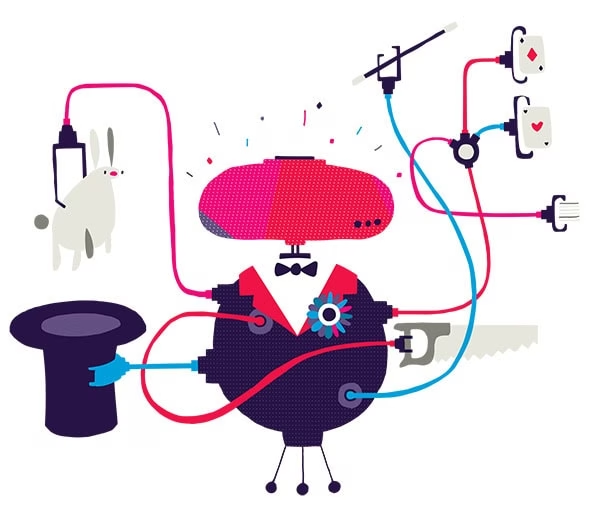
Since the advent of Deep Learning, the comforting objection to Artificial Intelligence, “A computer can only follow the program written by a human,” is no longer true.
Computers can now learn on their own.
Computers can solve problems on their own.
Computers can invent useful technology on their own.
They’ve done all the above.
But can robots get away with using misdirection on a human?
As of the time of this writing,
computers are the most primitive they will ever be.
A.I. Has been hailed as the new electricity. The last invention of humankind.
Already in 2017 there have been solutions to problems that no human or group of humans could have engineered. This “magic show” is happening right before our eyes—but this is no illusion.
We no longer when a computer has taken over mundane, uncreative, repetitive tasks. But will computers ever achieve the humor, intuition, and charm that a human must exhibit, such as needed in a live entertainer?
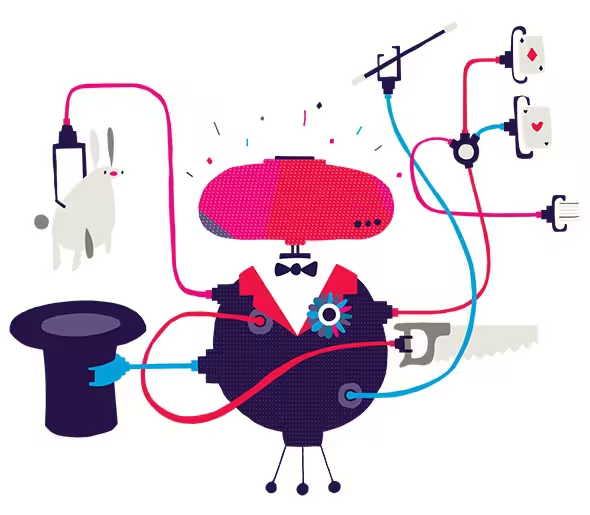
Many people who are aware of the approaching ubiquitous A.I. Are panicking about full automation and the imminent job crisis. They never think that with the decline in jobs comes the decline in prices. We have jobs so we can make money so we can pay other people in other jobs.

The doctor spent 10 years tirelessly learning to become a doctor—4 years in pre-med, 4 years in med school, and 2 years at residency. The doctor pays the taxi or limo driver. The taxi or limo driver pays the doctor.
Each pays the other with money earned in their jobs. Now imagine the doctor and driver. Each has a different need—one to get driven somewhere, the other to get the check up. Now these jobs are obsolete but that is not a problem. Neither needs money—the doctor need not pay the driver and the driver need not pay the doctor.

The robot drives the doctor (who now doesn’t need to be a doctor) and the A.I. Diagnoses and cures the driver. Next, apply this more generally to nearly all jobs, and you have less need for money. Therefore a “job crisis” doesn’t make sense anymore in the futuristic scenario that A.I. Is powerful enough to overtake the jobs.
So the panic people feel is based on contemporary assumptions—that if we want to eat a fish, we need money to pay the fisherman to go out and catch us a fish. Assuming fishing were automated, then there is no fisherman demanding compensation.
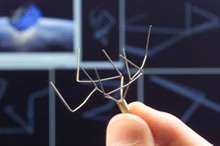
Some of the solutions that machine learning have arrived at aren’t even understood by human experts—but they are effective solutions nonetheless. Look at this little antenna to the right:
NASA Uses AI to Solve Antenna Problem
Even within this week, the $2.5 million Tricorder XPrize was awarded to self-funded team Final Frontier. Since 2012 many teams of humans used their puny human brains to develop a handy “tricorder” diagnostic device that diagnoses dozens of disorders and diseases, as if by magic. For five years, teams of the humans competed. Some of them might have said, “I’m a doctor, not a magician,” before giving up. In the end,five days before this writing, the prize was earned by Dxter, the heroic Artificial Intelligence. Dxter is one of many A.I.s that will eventually save millions of human lives.
Recent hints or assertions that robots will eventually replace or disrupt every human industry are becoming fulfilled.
Transportation
If you had to…
Would you hitchhike in a human-driven car, or a robot-driven car?
I’ve heard many say they would never let a machine drive them in a car.
AI is now driving a car better than a human (not that this is saying much). Somehow that seems more dangerous than letting a human drive you. Twenty or thirty years ago, the question might’ve been, “Would you want a computer to play chess on your behalf, or a human chess grandmaster?”
In 2017, anyone would choose the computer.
Having a computer drive for you may feel scary, but human decision-making is often governed by feelings, and feelings can often drive us straight into a telephone pole.
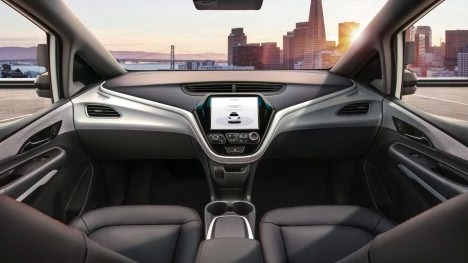
Pit 10,000 human drivers against 10,000 A.I. Drivers, and you’ll have far more safe trips in the latter camp (easy to say that now that we are in 2017). Never mind that you can’t be sure of the human’s state of intoxication or intentions. A human driver, no matter how excellent at driving a vehicle, may have corrupt intentions for his or her passenger. Add to that human error and the average human reaction speed/response time of two full seconds versus a computer’s reaction/response time of a few milliseconds, and the robot will beat the human 99 times out of 100. Easy.
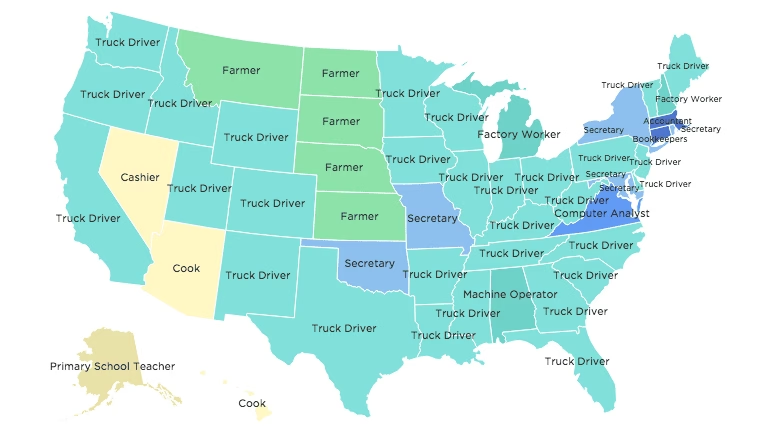
Healthcare
Ten years ago, anyone could have said that computers seemed “promising” for medicine. Now, it’s delivering on that promise. Its already happening. WATSON from IBM is about to take your doctor’s job. He doesn’t get tired like your doctor. He doesn’t make as many mistakes as your doctor. He can remember hundreds of thousands of historical cases and studies and detect patterns hidden inside, in a way that no human genius could.
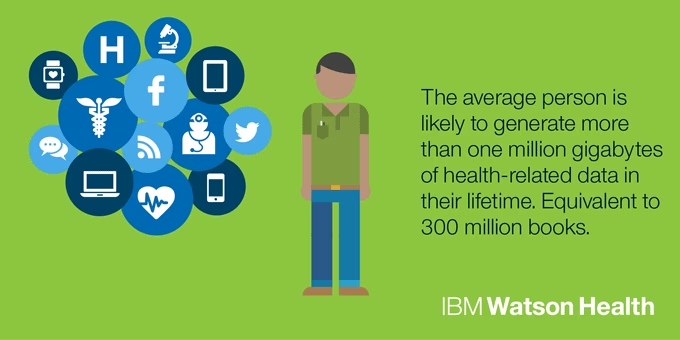
>
“In 2015, a research group at Mount Sinai Hospital in New York was inspired to apply deep learning to the hospital’s vast database of patient records.This data set features hundreds of variables on patients, drawn from their test results, doctor visits, and so on. Deep Patient, the resulting program, from more than 650,000 people, had been taught using the data, proved extremely good at predicting disease when tested on new records.
Deep Patient had discovered patterns concealed in the data of the hospital that appeared to suggest when individuals were on the track to a broad spectrum of diseases, including liver cancer—without any expert instruction.
The leader of the Mount Sinai team, Joel Dudley, said, “Indeed there are plenty of methods which are ‘pretty good’ when it comes to predicting disease looking at a patient’s records. However, he punctuated that statement with, “this wasway better.””
In this lecture, Andrew Ng said (at 58 minutes into the video) that a lot of radiologists that are graduating today will be impacted by A.I. In the course of their careers.
To become a physician, you need four years of pre-med, four years of med school, then two years at residency. It’s challenging for a human to become a doctor. This is something comes easy to A.I.
Computer creativity
If A.I. Is bound to replace doctors, it might replace most jobs. But I say that there are still—and will always be—labors of love whose human’s achievements robots will never approximate. At the risk of sounding like a crotchety old magician who will inevitably be proven wrong, let me assure you that this is coming from a technophile. My argument is not that robots cannot perform magic and will never be great magicians…but that no one will care. An example of creative industry that springs to mind is poetry. Here is one of my favorite poems:
When I in dreams behold thy fairest shade
Whose shade in dreams doth wake the sleeping morn
The daytime shadow of my love betrayed
Lends hideous night to dreaming’s faded form…
After a performing magic show in Evansville, Indiana, 2009, I wrote the above poem in the middle of the night when I woke from a dream covered in sweat. Nothing strange had happened during the previous show, so I’m not certain why I had this dream. I was hired to do a close up strolling magic performance, and immediately after I was asked to perform some extra bits on stage.
I was dreaming that I wasn’t really a magician, but an actor playing the part of a magician. In this movie, performing on stage during an event, I interrupted my performance when I saw my girlfriend in one of the front rows of the audience. The auditorium was dark and the spotlights were in my eyes, but I could still see her. Her hair was Brown instead of blonde, but that didn’t give me a second thought. I stopped the show and delivered the above poem spontaneously. It was a poem I had never memorized or read before in any book. Itcame to me.
In fact, no human wrote it, and the poem did not exist in 2009.
An intelligent machine composed it in 2014.
Just as the automobile displaced the horse and carriage (and along with that, the buggy whip maker), andas the internet displaced many careers, A.I. Will ina few years displace truck drivers, surgeons, and others.
In the past, automation replaced low-skill jobs. It’s now replacing high-skilled technical jobs (and the automation companies have a stronger motive to replace a thousand people who each make $200K/yr than to replace a thousand people who make $20K/yr).
A computer can now do the following better than the average human:
1. Recognize faces
2. Write music
3. Write poetry
4. Replicate its own knowledge (in humans this is called “culture” and “education”…in computers it’s called copy & paste the code, and data).
5. Diagnose cancer
6. Figure out the best route for 1,000 vehicles to take with 1,000 different destinations to optimize traffic flow
Can your laptop do all the above? No.
But there is a computer in the world that can.
Humans (arguably) get a bit smarter every decade.
Their knowledge increases incrementally.
Computers aren’t getting dumber.
Computers get a smarter every 6 months.
Their knowledge increases geometrically and exponentially.
Soon it will be everywhere. It won’t replacethe middle class.
But there’s a problem with this argument: taking automation to the logical end means humans will not have any job. Will machines then buy the goods they want and prop up the companies they work for? Probably not.
Retail will crumble if no one has money to buy anything and machine workers can’t replace that. Sure you’ll be able to automate things more and more in the future but not having human workers to pay for their time means less revenue for the larger companies.
It means that the average person can do the work of a large corporation on a smaller scale with less overhead. If anything, starting a business should be easier.
There are plenty of jobs that peopledon’t want a machine to do also. Would you want a machine to be your artistic director or your new favorite band or your salesman? Probably not because the people purchasing those goods want human interaction and relationships. Sure, mailroom workers went away with the invention of email and things like that will happen again but it’s not feasible for machines totake over especially within the next 5-10 years like headlines say.
Some of the above points presuppose the necessity of “companies” (which need to be propped up), and the necessity of “money,” and “time paid for with money.”
Now I’ve gone off the deep end…
It may sound absurd to dispute the necessity of money, but I would argue that money is only necessary when labor and goods are scarce resources (I could be wrong, but that’sa point I’m making).
The argument that we’d prefer a human to do certain jobs sounds good when you don’t think about it long, but I think it has a way of being proved wrong.
I’ve heard from several passionate people many times, “I would never trust a robot to drive my car.” That kind of thinking is foolish, since people trust humans to drive cars, and already robots drive much safer than any human—a machine’s reaction time is a few milliseconds whereas the average reaction time of a human is two full seconds. A machine does not get drowsy, does not text and drive (though it could do so and would still be capable of attending to the road), and does not get drunk.
You might think of other jobs like therapist, school counselor, massage therapist, doctor, funeral director, baby sitter, elementary school teacher, 911 operator, judge, defense attorney. I can understand how people might shudder to think of a robot doing these jobs. But I can imagine the possibility of a robot therapist sensing what I’m feeling 100 times better than the best human therapist in my area; I can imagine the robot issuing me the exact turn of phrase, the words of wisdom, the comforting or inspirational message, in exactly the tone of voice I need to hear in that moment.
In 2019, there is a fully-autonomous robot or virtual teacher in the classroom. This robot has studied the top 1,000 teachers and viewed 10 million recorded classrooms. It knows the learning style of each student and is as effective as a private one-on-one tutor. It can display an animation catered to the student’s interest to aid learning. It even knows all the jokes that those top 1,000 teachers uttered that made every student laugh. The human teacher with 10 years experience knows 10 or 20 tricks to motivate students. The robot teacher knows 1,000 tricks to motivate a dyslexic male 6 year old who is new to school, another 1,000 tricks to motivate a native Spanish speaking 10 year old girl, and another 1,000 tricks to motivate the… You get the idea.
This is already happening—VIPKID is a corrupt company with 20,000 teachers teaching 20 million students (I believe that’s the number of Chinese students). The 20K teachers are native English speakers teaching English to Chinese kids over the webcam. The company is training its A.I. On the class recordings. I don’t know where that’s headed, but I would guess they will have a cartoon teacher designed for each student, and the cartoon teacher can teach English and pronunciation with excellent, exaggerated facial expression showing the mouth movements and positions. This will be much cheaper than paying 20,000 teachers $20/hour every day.
When the A.I. Teacher is ready, VIPKID will need to pay only the cost of maintaining that A.I., which is surely less costly than paying a million dollars per day to the humans.
VIPKID, the world’s largest online English education company, announced August 23rd 2017 that it has raised $200 million in series D financing, the largest round of funding ever raised in the sector.
Tencent announced a strategic partnership with VIPKID in the areas of narrow artificial intelligence and online education, for the development and training of “Dino,” a virtual, intelligent fully autonomous tutor.
This job replacement is happening now. VIPKID is downsizing.
It will end in complete decimation of all VIPKID teacher jobs.
Many optimists say that jobs will go, jobs will come.
In the Industrial Revolution, artisan jobs became assembly line jobs—jobs were lost and jobs were gained. However, in this scenario, the job of tutoring is completed.
Three trends drive Dino’s evolution:
The first is a lot more data (your recorded classes).
VIPKID Recorded classes are the lifeblood of the DINO machine learning system.
The second thing is vastly more computer power. This is why VIPKID in bed with Tencent is harnessing cloud computing.
Last, breakthroughs in the basic algorithms.
When you put the above three together, there is a million fold improvement compared witha few years ago.
What does this mean for you?
Your job is gone completely.
When you signed your contract with VIPKID,
you became a data contributor. With everyclass you teach, you are giving VIPKID training data to make its A.I. Stronger.
VIPKID in its “Great Decoupling” plan, aims to decouple one American teacher with one Chinese student, and supplant that model with one A.I. Teacher which can teach thousands of Chinese students simultaneously.
Even if VIPKID freezes all its research and training right now, the existing technology it already has, turned into its A.I. Dino product can generate a working, animated, fully autonomous A.I. That is capable of teaching a 25 minute English class and submitting feedback.
VIPKID has different ways of deploying this technology in its new platform. These different ways lead to the same outcome. VIPKID is changing the future of work, and not in a way that everyone benefits.
Dino won’t stay a baby baby for long….
This is happening right now.
UPDATE: I wrote this is in April 2017, when VIPKID had 20,000 teachers. Now in July 2018 the VIPKID teacher can count 60,000 competing VIPKID teachers. The increase in VIPKID students isas dramatic. This means the daily cost of paying its human teachers is ever greater (triple…millions of dollars each day).
As you can see in the vipkid ai video below, it’s happening now-just a year after my prediction.
In the coming few years, it will be easiest to appreciate how much better the robots are at driving. The robot driver has more than two eyes, it has 8 eyes. It can see in front, behind the car, and sideways. It can sense a deer a hundred yards in front of the car. When driving up a hill and approaching the crest, the robot knows whether there is an oncoming car approaching from the other side of the hill.
If we take this to its extreme, everything that is rare, valuable, and expensive now will be easily accessible in the future. This means it will be so cheap that it will be free. This renders money as relevant as a saddle (and the saddle maker).
A human doctor earns a high salary. He is paid by other humans (who themselves earned their own money in their own jobs of course) a lot of money for the service rendered, because he spent 4 years in pre-med school, another 4 studying medicine, another 2 years in residency to become an outstanding doctor by human standards. Soon we will have an A.I. That is a thousand times more effective than the human doctor. The A.I. Has the combined education and experience of all our best doctors. Will you choose the robot doctor that has 40,000 years experience and who has perfect recall of 2.4 million images of your ailment? Or will you choose the human doctor with 20 years experience because he has kind eyes?
All the above won’t happen in 5 years (just a guess),
but eventually that is bound to happen.
Robots can now paint in the style of Van Gogh or Rembrandt, and are starting to get creative. The robots are doing things that our best humans cannot understand. They even came up with a language that only the robots understood, started chatting with one another, and our human programmers don’t know what was said.
I’m not sure what happens to the human computer programmers. One would think that the human programmers will be the ruling class in the future, but I am aware of an instance where the A.I. Wrote a program using Python code, which might make computer programmers less in demand.
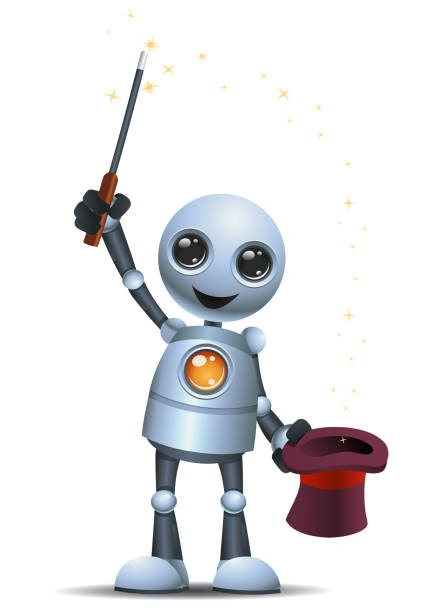
Part of the attraction to a magician performing a magic show is that despite his performance of amazing magic, we know, deep down, he is like us. He is human. A human perhaps with some awkward ticks and some human drawbacks—performing a miniature miracle, masquerading as a magician. It is remarkable when a human can do something superhuman.
Will a robot make you laugh? Will a robot make you gasp?
Only by accident.
Robots will never displace magicians because nobody cares whether a robot can do something a human cannot. Do you care that the computer can beat you in chess?
Maybe 20 or 30 years ago we cared. But we get accustomed to technology eclipsing human achievements. We’ve grown accustomed to special effects in movies. We’ve grown accustomed to holding supercomputers in the palm of our hands. But you’ll never be accustomed to a magician vanishing something from your own hand.
When a robot or computer does something a human cannot do, that is not astonishing—it is useful. However, when technology advances to such an extent that objects vanishing in our own hands has become mundane, this may be the death of the magician for hire.
Just as the advancement of movie special effects resulted in the decline in interest in stage magic shows (where you may be watching a magician from 200 feet away), so the advancement in technology arouses suspicion that the magician may be depending on some new gadget that only few know about.
The issue is not whether the magician is using new technology in his act (this is rarer than you’d think and usually unnecessary), but whether his audience may reach for that explanation; for, the true professional never relaxes in the knowledge that he did not, in actuality, use the method that his spectator assumed he used. He can only relax when his spectators have no where to go in their deductions and speculations. That the spectators suspect the wrong method isas damaging to the magic show as if they had arrived at the correct secret method.
Every job can be automated—except your own of course…right?
Wrong.
Show a caveman technology and he will think it’s magic.
Show modern man magic and he will think it’s technology.
Eventually, the impossible will become possible, and thus mundane.
Jon Finch is a professional entertainer in the Midwest, a mentalist, pickpocket, and magician who performs at corporate and social events. Having performed in over 50 countries (well…counties), across Chicago, Indianapolis, St Louis, Cincinnati, and Louisville, he offers entertainment sharing his comedy, creative brand of strong magic, extraordinary mentalism.
